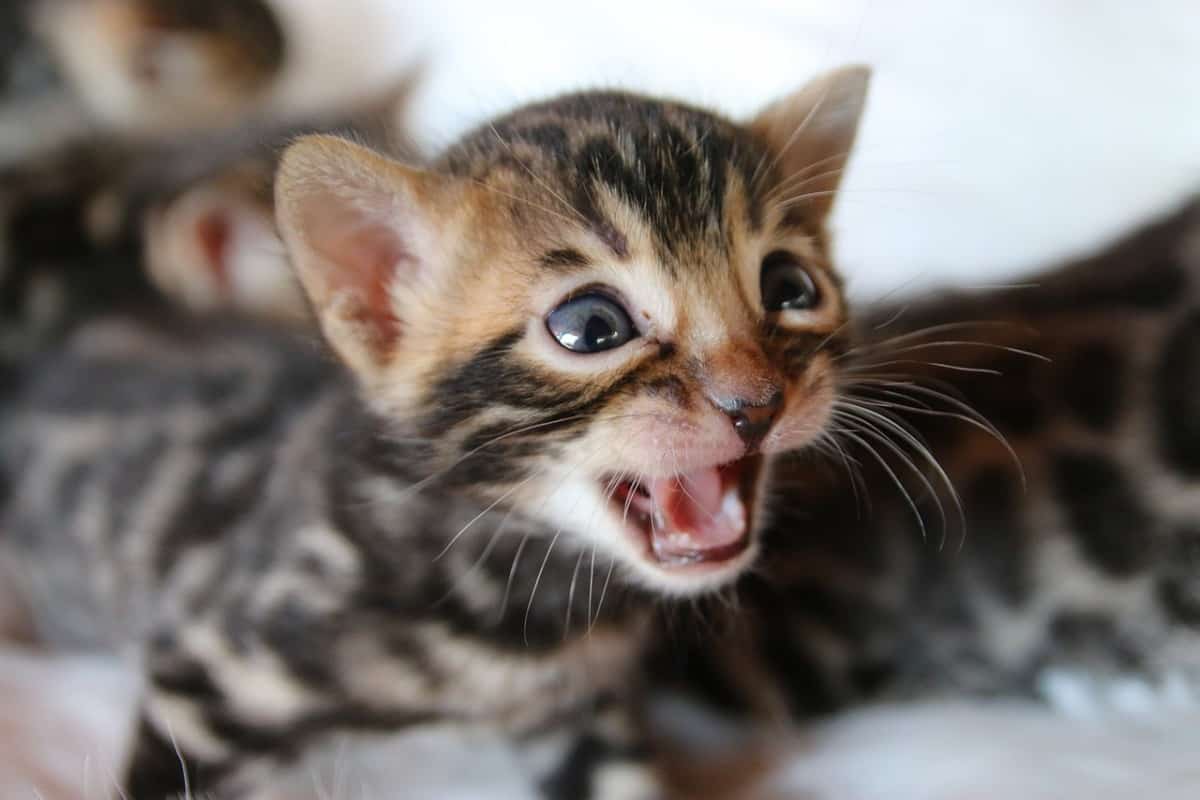In most cases, when your precious fur baby starts meowing a lot, it’s nothing for great worry or major concern. Cats, like people, have variances in personalities and vociferousness. And, like people, they periodically invent ways to keep things interesting for themselves and keep you on your toes.
The Cat’s Meow: An Uptick in Vocalization
It’s three in the morning and you stumble out of bed because of some sort of noise. You soon discover that it’s your cat who keeps meowing super loud. This is a new thing for her and she’s been at it for several nights in a row.
By all appearances, nothing seems to be wrong. She’s eating fine, purring well, and going to the bathroom as normal as ever. Nothing seems out of the ordinary.
So, why is the cat meowing a lot suddenly? Why has she become such a chatty catty? Could there be something serious and wrong?
The need to take your cat to the vet for meowing is rare, but it is a consideration. If increased meowing accompanies bouts of vomit or abnormal digestion, it’s definitely time to make an appointment.
Reading Your Cat
Your feline may be trying to tell you something’s wrong if their status quo is quiet with an onset of uncharacteristic meowing. If they usually talk a lot but meow in the middle of the night at random, it could be they just want attention.
If the latter scenario is the case, the best way to handle this is to ignore them. Yes, that cute little meow is irresistible especially when it gains a certain amount of volume.
But if you want them to stop because you know they’re “hamming it up,” you have to ignore them so you can get some shuteye. They will, more often than not, stop this behavior if they know you’re not buying into their ploys for attention.
That is unless they’ve discovered what an echo is. At nighttime, it’s quiet in the house and if you have a large hallway or the basement door is open, they may discover the reverb of their voice. It is not unheard of for cats to enjoy talking to themselves when they discover they can create their own echo.
Medical Afflictions
If the meowing is unusual and out of character for your cat, there could be a plethora of things wrong with it. You won’t know exactly what that is until a vet checks it out. Stay calm, don’t freak out, and don’t panic. Inspect the cat and pay attention to it.
Cats have no other way to communicate when they are in pain or have the ability to show you where it hurts, so it’s important to pay attention to the way they meow and what they do. Take note of things like bathroom use, physical activity, eating habits, and sleeping patterns.
Also, notice if they lick or scratch at certain areas of their body more than usual. Pay attention to mannerisms and behaviors that appear to be babying or nursing areas of the body. This is common if they limp or aren’t putting pressure on a leg or paw due to some sort of incurred injury.
Elderly Cats
Cats advancing in age tend to meow more not only because their cognitive abilities are going but also because they could be sick or in pain. Generally speaking, older cats will require more medical attention.
Any cat over seven years old should have regular visits to the vet at least twice a year. Be sure to have them checked for hyperthyroidism, food allergies, and high blood pressure. All these can be contributing factors as to why your cat has become more vocal.
Mating Calls
It could be that your cat is in heat and wants to breed. Meowing is commonplace when cats desire the company of the opposite sex. It’s actually how they call potential mates to themselves. Getting them spayed or neutered will usually put an end to this kind of meowing.
More Meowing Usually Isn’t Serious
If your cat is a new addition to the family, it could be trying to communicate that it’s hungry and wants to make sure you don’t forget about them. This is going to be especially true if they’re a rescue and/or they suffered some kind of abuse.
Cats on a feeding schedule tend to be pertinent about their food, especially if you are late. Cats have internal feeding clocks and will make their displeasure very plain to you. Staring, meowing, hanging out by the food bowl, and rubbing against your leg until you feed them are some common behaviors.
If you are gone for long periods of time throughout the day, their meow may be a request for attention. Kitties thrive on their interactions with humans and some need constant reassurance. This is why some of them are so insistent with meowing when requesting your attention.
Outdoor cats are prone to meowing to indicate coming inside or going outside. Cats who seem indecisive about this may be playing with you because they can’t get attention from you any other way or time. If you want them to stop this finicky behavior, set some time aside every day to interact and play with them.
If you do have a cat who loves the great outdoors, it is imperative you understand the nuances of their meow. Many things can happen to them outside you will not be privy to. Injuries from fighting with other cats, eating something they shouldn’t have or contracting diseases from other animals may cause them to escalate meowing.
Changes in your job, work schedule, or another new pet or baby can increase the meowing. Not only is this to express their displeasure at what’s happening but may also be a signal of stress to you. If this is the case, make sure you spend special time with the cat to reinforce your displays of love for them. This will reassure them.
If you have a new baby that consumes most of your time and energy, learn to spend a little time with the cat every day. Just like scheduled feeding times, have scheduled interaction times. Remember, cats need love and affection as much as your new bundle of joy.
If the cat becomes too jealous of the baby, problems can ensue that are completely avoidable. Reaffirming the cat’s role in the family by giving them attention will help prevent problems like smothering and scratching.
Kitty Personality; Language
But maybe their reasons aren’t as selfish as you may suppose. Sometimes they only want to greet and say, “hello” to you when you come home.
Other times they want to have a simple conversation with you. There are cats who just like to talk, although neither of you may know what the other is saying. For some felines, having a conversation satisfies their attention needs from you.
Also, if you speak enough and often with the same words, cats will know what you mean. For instance, let’s say your cat is one of those who plays a little too rough and draws blood from your hand.
Telling them “ouch” or “ow” on a consistent basis followed with immediate removal of your attention will send the message crystal clear. Do not hit or be cruel, it will not send the right message across.
It’s well known that cats understand their name when you say it. Repetitive vocalization of their name will sink in with time and patience. It’s best to have names that contain one or two syllables as this is the easiest way for them to comprehend that they have one.
Did you know cats can also have a name for you in the meow language? It’s true! But it’s up to you to understand it and react to it in an appropriate manner. If you acknowledge their name for you, it will improve the bond you share with your cat.
Actually, meowing is unique in how cats communicate with humans. Cats understand humans react to noise and are acute in using that to their advantage.
As baby kittens, they may meow for their mothers but once they go out into the world on their own, they have little use for it. When interacting with other cats, they generally use trills and purrs or hisses and growls. It all depends on how friendly they are with each other.
Knowing your cat is the first essential step to understanding why they’ve begun meowing more and louder. Most oftentimes, it’s not a health issue and more likely they’re trying to get your attention.
Paying heed to the cat when the meow is the second-most step. Perceiving them as a kind of individual. They have their own language, personality, and character.
Having this kind of rapport with your cat goes a long way in understanding any surge’s vocalization.
[su_box title=”Affiliate Disclosure”]This website is supported by its readers. Please assume that all links are affiliate links. If you make a purchase from one of the links we will make a commission from Amazon. Thank you.[/su_box]





